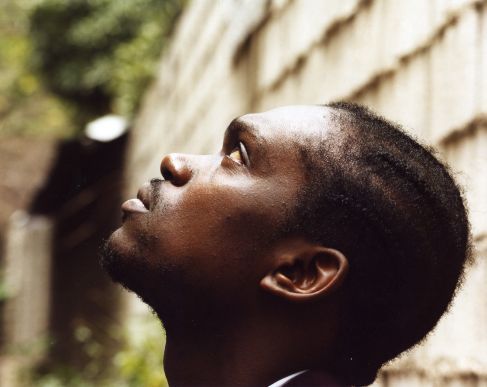Born Glendale Gordon but later changed his name to Reanno Gordon. Busy Signal was born on January 24, 1982 and raised alongside three brothers and a sister by his devoutly Christian mother in the St. Ann’s parish community of Brown’s Town, Busy’s first exposure to music, like so many Jamaican youth, was in the church. While attending services and singing hymns he realized he possessed immense vocal talent and earned his very first encore from the church congregation; when services concluded, Busy would substitute the hymnal lyrics with his own words, much to the consternation of his mother.
In his early teens Busy’s family relocated to Kingston moving between the garrison communities of Standpipe, Tivoli Gardens and Papine, volatile environments that continue to inspire his gritty lyrical depictions. As a student Busy would save his lunch money to buy cassettes of popular music, everything from Madonna and Whitney Houston to Jay Z and Eminem and he was repeatedly reprimanded for beating out riddims on his desk. At night, he often snuck out of the house to hear such preeminent sound systems as Renaissance and Bass Odyssey, fascinated by the deejays’ voices that boomed through the towering assemblage of speakers.
Busy made the requisite links with several sound systems in hopes of becoming a recording artist and gained a modicum of studio experience voicing dub plates for Renaissance and Kilimanjaro. “Getting into the studio to do my first recording, I linked up with Fatta one of the engineers from Renaissance, then it was just on the rise from there,” Busy recalls. “I was trying to learn, trying to get it in the right context, melody, the verses, trying to know what is a hook, the importance of breath control, metaphor and word play, just trying to get better towards what I want to be in life.” Busy took a step towards reaching his goals with the release of his first single “Shake It Fast”, voiced on Renaissance’s Tunda Clap riddim. His breakthrough, however, arrived in 2005 with the hits “Not Going Down” and the self produced “Step Out”, the title track of Busy’s critically acclaimed 2006 debut album released on Greensleeves Records. “Step Out” also featured the haunting ghetto narrative “Born and Grow” and the indomitable “Not Going Down” as well as a cadre of guest artists including Bounty Killer who mentored the early stages of Busy’s career and provided the aspiring deejay with his first opportunity to display his talent in front of a Jamaican audience. Busy’s association with the Killer led artists’ consortium called The Alliance brought him further renown, as did a succession of hit singles for various producers and his consistently enthralling performances at major Jamaican stage shows including Sting and Reggae Sumfest. With the release of “Loaded” in September 2008 for VP Records, characterized by its authentic street savvy, quick wit, and mesmerizing vocal stream, Busy’s music was now cited as the gold standard for a new generation of dancehall releases. “Loaded” included such mega hits as the risqué “Tic Toc” (which ranked at number 70 on Rolling Stone’s 100 Best Singles of 2008); “These Are The Days”, a bitter commentary on the poverty and violence intrinsic to ghetto life and the compelling “Jail”, a grim recollection of Busy’s brief incarceration in the US. “The streets come with a lot of stuff; I was locked up once, a conspiracy charge, then I got bail,” Busy admits. “After that I was like I don’t want to be in the street, in the mixup or the confusion. I just want to do music.” Whereas “Step Out” generated inaugural accolades and “Loaded” captured international attention, “D.O.B.” is poised to bring Busy the (dancehall) superstar status his vast, diversified talents merit. To insure a smooth delivery in the rebirth of dancehall that arrives with “D.O.B.” Busy chose to work with several of Jamaica’s finest upcoming producers including ” Clayton “Claybeat” Morrison and Carlington “Karl” Morrison, Karim “DJ Karim” Thompson, Kirk “Kirkledove” Bennet, Kalonji D’Aguilar, T’Jean Bennett and Andrew Myrie for UIM Records and, arguably, contemporary dancehall’s most successful hit maker, 20 year old Stephen “Di Genius” McGregor. “I get real work done with young producers, no disrespect to the big producers but I just try to give young producers an opportunity to get real work and real production out there,” says Busy. The astonishing breadth of Busy’s vocal talents are expressed through various guises on D.O.B. from the fiery Spanish chanter of “Picante” and the self-produced, boldly orchestrated “Busy Latino”, to “hot gal” fashion commentator on “Hair Dresser Shop” to herb connoisseur on “Hi Grade”, its lyrics deftly delivered over a brilliant reworking of the immortal Stalag 17 riddim courtesy of Busy’s manager, veteran engineer/producer
Shane Brown.
Busy’s hypnotic flow expresses appreciation for females’ “wining” skills on “How U Bad So”, “Gal Dem Song” and the big hit “‘Pon Me”, the latter produced by the renowned duo Diplo and Switch, better known by their dancehall persona Major Lazer. Surprisingly robust-baritone phrasings complemented by orchestral inspired synth-strings dominate the thug-themed oratorio “Opera”. “Sometimes I listen to opera and people look at me like what am I trying to do?” discloses Busy who first heard the late, celebrated tenor Luciano Pavarotti at a friend’s house and was duly inspired to purchase his music. “Opera is not my music but I listen to its sound; the way the voice projects in opera it can shatter glass; that is vocal strength so I listen to that a lot.” “Sweet Love (Night Shift)” originally a number one hit in 1985 by The Commodores gets a similar treatment to “One More Night” with a gentle one-drop rhythm framing his confident
melding of lover’s rock romanticism with dancehall’s bolder carnal expression. Busy’s most compelling role on D.O.B. is as a spokesperson for disenfranchised (Jamaican) youth on several rugged, rhapsodic ghetto psalms. “Nuh Boy Caan Buy Wi Out” offers a riveting a cappella delivery relating the importance of remaining true to one’s principles despite tough circumstances. “Yes Dawg” provides an affirmation for inner city youths to reach their goals despite a system that Busy decries as “set up so the youths get paralyzed, hypocrites with dem bag a lies” and he smoothly alternates
between deejay chat and American style rap, seeking “a Brinks full ah money right now” to help alleviate ghetto suffering on “My Money (Money Tree)”. Bounty Killer joins Busy for “Summn’ A Guh Gwaan”, a warning of the inevitable consequences when Jamaica’s poorest citizens are further squeezed by rising prices and diminishing services: “when dem run de higglers dem off de street, and de pickney get hungry can’t find food fe eat/and de big guys turn dem head like dem no see it…summn’ a guh gwaan.” The fearlessness chronicled through a series of blood-splattered gangster exploits on “Nuh Fraid”, which captures the sinister pulse that courses through Kingston’s garrison
enclaves is definitely not for the faint hearted.
Violent scenarios depicted in various song lyrics have been repeatedly criticized for inciting real life carnage but Busy defends their inclusion in his rebirthing of dancehall as an unfortunate but authentic representation of life in the ghetto. “Guns are things we see all over, if there were no guns nobody could sing gun lyrics,” Busy reasons. “But artists
definitely have to take at least a percentage of the responsibility in trying to balance it in the music.” Busy strives for equilibrium with “Peace Reign”: accompanied solely by an acoustic guitar, he pleads for a better way while seeking for peace for all mankind, revealing perhaps the most significant aspect of the charismatic, multifaceted musical
identity presented on D.O.B. “People listen to Busy Signal and they will hear clean stuff and raw stuff but they won’t hear 100% of either,” he notes. “I try to have that edge but balance it basically because I have corporate people that look up to me and ghetto people that look up to me too.






